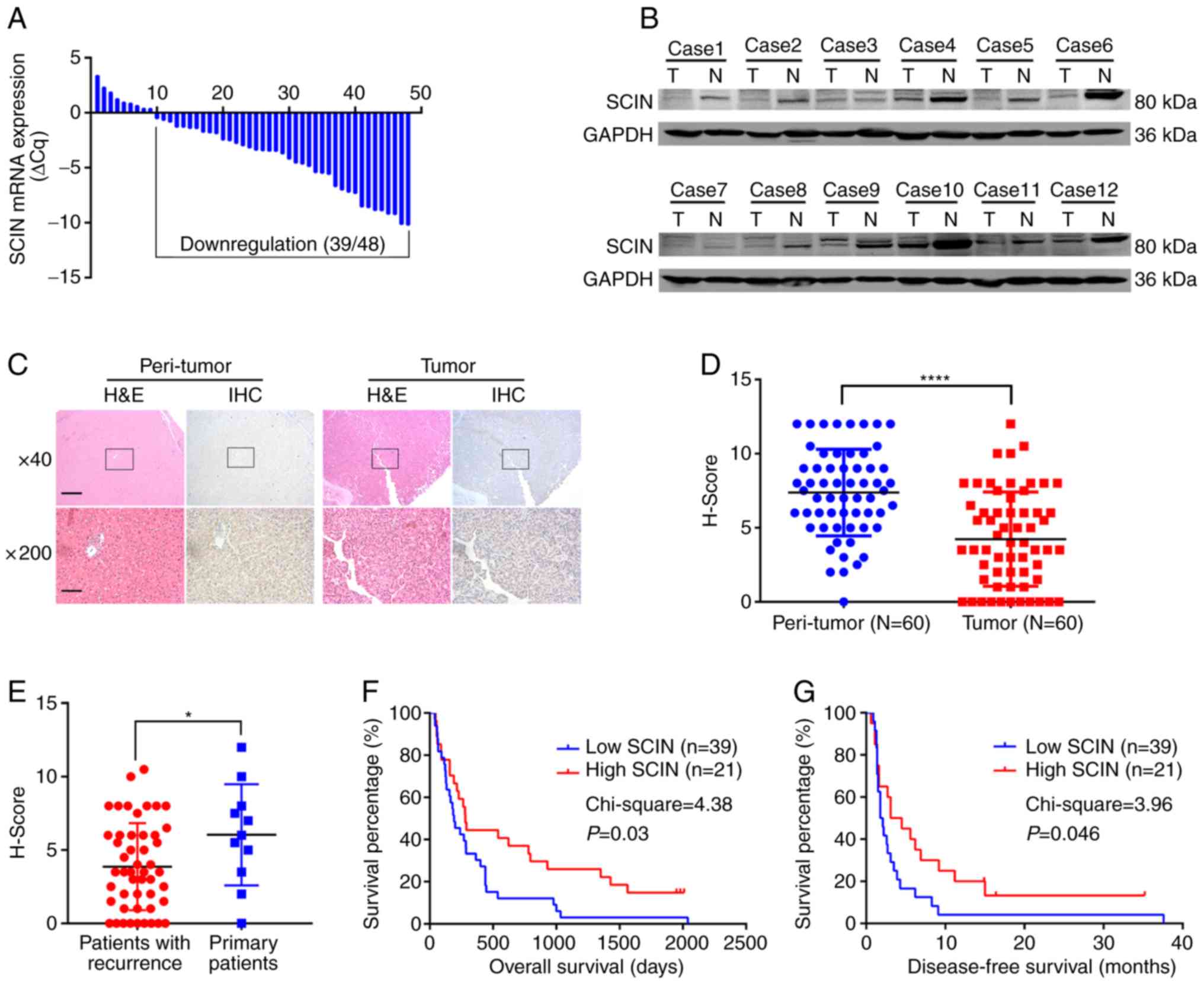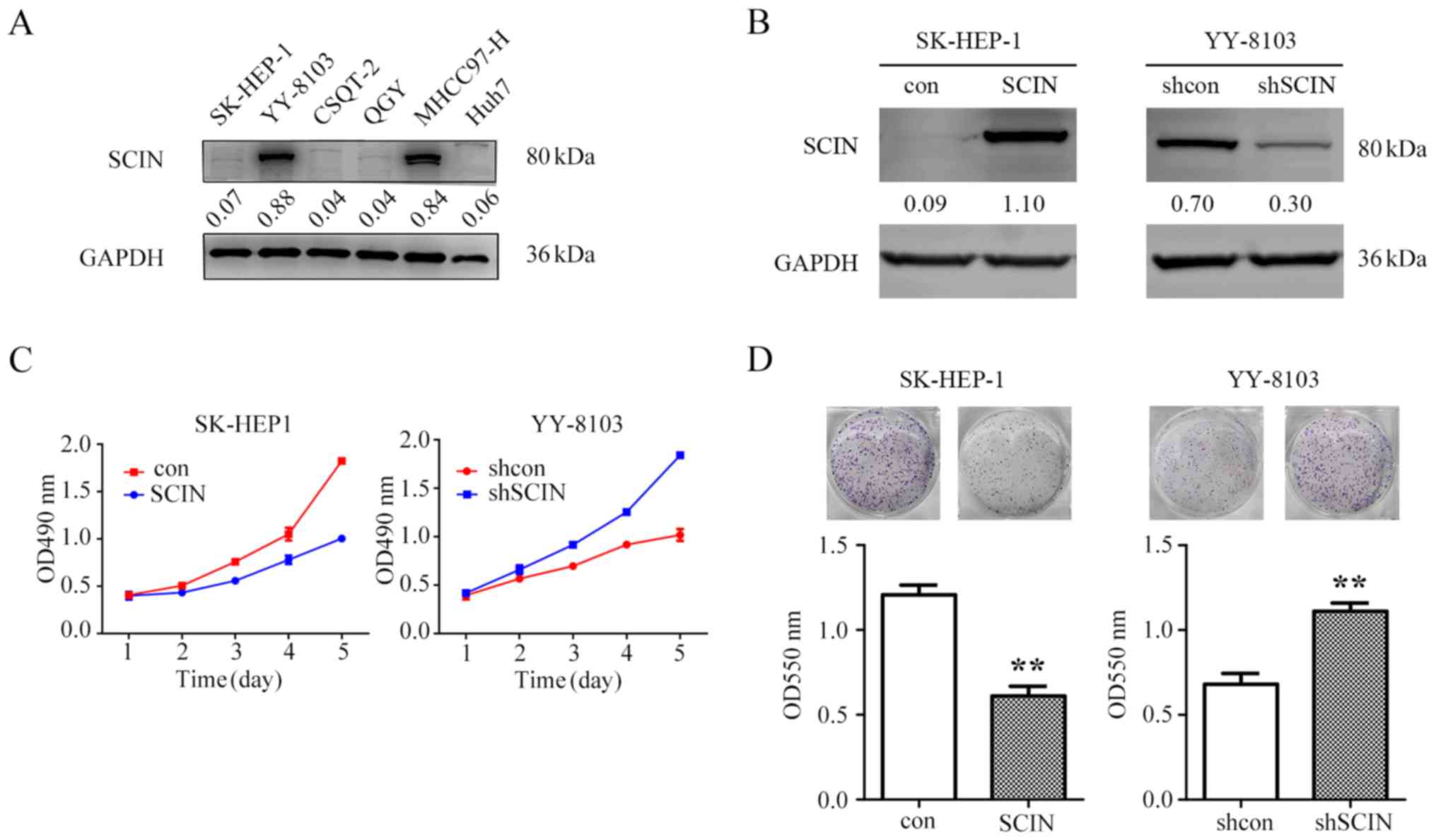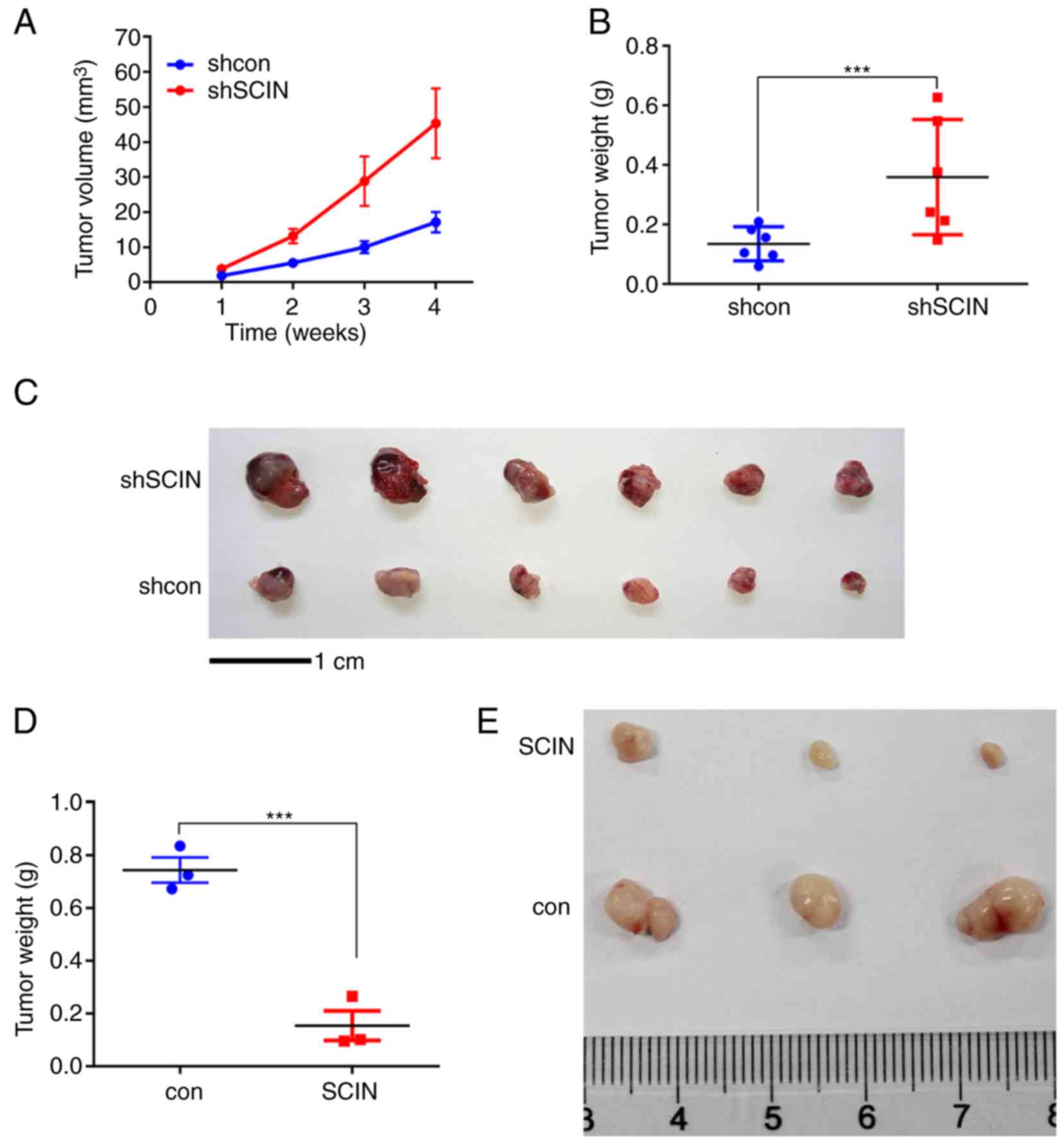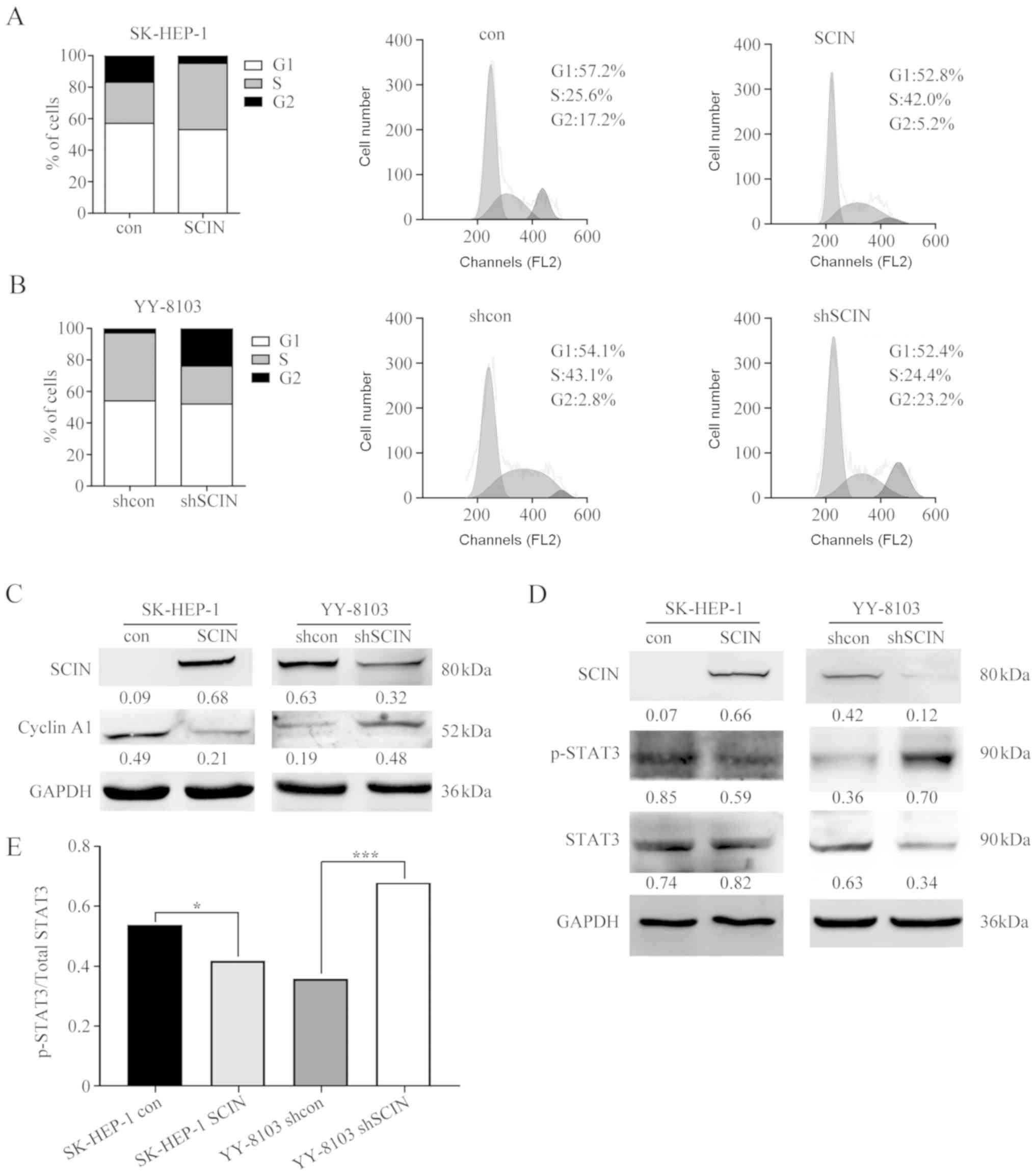|
1
|
Siegel RL, Miller KD and Jemal A: Cancer
statistics, 2019. CA Cancer J Clin. 69:7–34. 2019. View Article : Google Scholar : PubMed/NCBI
|
|
2
|
Orcutt ST and Anaya DA: Liver resection
and surgical strategies for management of primary liver cancer.
Cancer Control. 25:10732748177446212018. View Article : Google Scholar : PubMed/NCBI
|
|
3
|
Zhang Y, Liu S, Wang X, Zhang Z, Jing X,
Zhang P and Xie Z: Prevention of local liver cancer recurrence
after surgery using multilayered cisplatin-loaded polylactide
electrospun nanofbers. Chin J Polym Sci. 32:1111–1118. 2014.
View Article : Google Scholar
|
|
4
|
Zhang XP, Chen ZH, Zhou TF, Li LQ, Chen
MS, Wen TF, Shi J, Guo WX, Wu MC, Lau WY, et al: A nomogram to
predict early postoperative recurrence of hepatocellular carcinoma
with portal vein tumour thrombus after R0 liver resection: A
large-scale, multicenter study. Eur J Surg Oncol. 45:1644–1651.
2019. View Article : Google Scholar : PubMed/NCBI
|
|
5
|
Rodríguez Del Castillo A, Vitale ML,
Tchakarov L and Trifaró JM: Human platelets contain scinderin, a
Ca(2+)-dependent actin filament-severing protein. Thromb Haemost.
67:248–251. 1992. View Article : Google Scholar : PubMed/NCBI
|
|
6
|
Dumitrescu Pene T, Rosé SD, Lejen T, Marcu
MG and Trifaró JM: Expression of various scinderin domains in
chromaffin cells indicates that this protein acts as a molecular
switch in the control of actin filament dynamics and exocytosis. J
Neurochem. 92:780–789. 2005. View Article : Google Scholar : PubMed/NCBI
|
|
7
|
Trifaro JM, Gasman S and Gutierrez LM:
Cytoskeletal control of vesicle transport and exocytosis in
chromaffin cells. Acta Physiol (Oxf). 192:165–172. 2008. View Article : Google Scholar : PubMed/NCBI
|
|
8
|
Zunino R, Li Q, Rosé SD, Romero-Benítez
MM, Lejen T, Brandan NC and Trifaró JM: Expression of scinderin in
megakaryoblastic leukemia cells induces differentiation,
maturation, and apoptosis with release of plateletlike particles
and inhibits proliferation and tumorigenesis. Blood. 98:2210–2219.
2001. View Article : Google Scholar : PubMed/NCBI
|
|
9
|
Jiang H, Wang Y, Viniegra A, Sima C,
McCulloch CA and Glogauer M: Adseverin plays a role in osteoclast
differentiation and periodontal disease-mediated bone loss. FASEB
J. 29:2281–2291. 2015. View Article : Google Scholar : PubMed/NCBI
|
|
10
|
Wang D, Sun SQ, Yu YH, Wu WZ, Yang SL and
Tan JM: Suppression of SCIN inhibits human prostate cancer cell
proliferation and induces G0/G1 phase arrest. Int J Oncol.
44:161–166. 2014. View Article : Google Scholar : PubMed/NCBI
|
|
11
|
Liu H, Shi D, Liu T, Yu Z and Zhou C:
Lentivirus-mediated silencing of SCIN inhibits proliferation of
human lung carcinoma cells. Gene. 554:32–39. 2015. View Article : Google Scholar : PubMed/NCBI
|
|
12
|
Liu JJ, Liu JY, Chen J, Wu YX, Yan P, Ji
CD, Wang YX, Xiang DF, Zhang X, Zhang P, et al: Scinderin promotes
the invasion and metastasis of gastric cancer cells and predicts
the outcome of patients. Cancer Lett. 376:110–117. 2016. View Article : Google Scholar : PubMed/NCBI
|
|
13
|
Chen XM, Guo JM, Chen P, Mao LG, Feng WY,
Le DH and Li KQ: Suppression of scinderin modulates
epithelial-mesenchymal transition markers in highly metastatic
gastric cancer cell line SGC-7901. Mol Med Rep. 10:2327–2333. 2014.
View Article : Google Scholar : PubMed/NCBI
|
|
14
|
Zhang ZH, Zhang W, Zhou JD, Zhang TJ, Ma
JC, Xu ZJ, Lian XY, Wu DH, Wen XM, Deng ZQ, et al: Decreased SCIN
expression, associated with promoter methylation, is a valuable
predictor for prognosis in acute myeloid leukemia. Mol Carcinog.
57:735–744. 2018. View
Article : Google Scholar : PubMed/NCBI
|
|
15
|
Hasmim M, Badoual C, Vielh P, Drusch F,
Marty V, Laplanche A, de Oliveira Diniz M, Roussel H, De Guillebon
E, Oudard S, et al: Expression of EPHRIN-A1, SCINDERIN and MHC
class I molecules in head and neck cancers and relationship with
the prognostic value of intratumoral CD8+ T cells. BMC
Cancer. 13:5922013. View Article : Google Scholar : PubMed/NCBI
|
|
16
|
European Association for the Study of the
Liver. Electronic address, . easloffice@easloffice.eu European
Association for the Study of the Liver: EASL clinical practice
guidelines: Management of hepatocellular carcinoma. J Hepatol.
69:182–236. 2018. View Article : Google Scholar : PubMed/NCBI
|
|
17
|
Wang T, Hu HS, Feng YX, Shi J, Li N, Guo
WX, Xue J, Xie D, Liu SR, Wu MC and Cheng SQ: Characterisation of a
novel cell line (CSQT-2) with high metastatic activity derived from
portal vein tumour thrombus of hepatocellular carcinoma. Br J
Cancer. 102:1618–1626. 2010. View Article : Google Scholar : PubMed/NCBI
|
|
18
|
Li JJ, Liu DP, Liu GT and Xie D: EphrinA5
acts as a tumor suppressor in glioma by negative regulation of
epidermal growth factor receptor. Oncogene. 28:1759–1768. 2009.
View Article : Google Scholar : PubMed/NCBI
|
|
19
|
Livak KJ and Schmittgen TD: Analysis of
relative gene expression data using real-time quantitative PCR and
the 2(-Delta Delta C(T)) method. Methods. 25:402–408. 2001.
View Article : Google Scholar : PubMed/NCBI
|
|
20
|
Deng YZ, Chen PP, Wang Y, Yin D, Koeffler
HP, Li B, Tong XJ and Xie D: Connective tissue growth factor is
overexpressed in esophageal squamous cell carcinoma and promotes
tumorigenicity through beta-catenin-T-cell factor/Lef signaling. J
Biol Chem. 282:36571–36581. 2007. View Article : Google Scholar : PubMed/NCBI
|
|
21
|
Ehedego H, Mohs A, Jansen B, Hiththetiya
K, Sicinski P, Liedtke C and Trautwein C: Loss of Cyclin E1
attenuates hepatitis and hepatocarcinogenesis in a mouse model of
chronic liver injury. Oncogene. 37:3329–3339. 2018. View Article : Google Scholar : PubMed/NCBI
|
|
22
|
Mohamed E, Al-Khami AA and Rodriguez PC:
The cellular metabolic landscape in the tumor milieu regulates the
activity of myeloid infiltrates. Cell Mol Immunol. 15:421–427.
2018. View Article : Google Scholar : PubMed/NCBI
|
|
23
|
Nguyen VT, Law MG and Dore GJ: Hepatitis
B-related hepatocellular carcinoma: Epidemiological characteristics
and disease burden. J Viral Hepat. 16:453–463. 2009. View Article : Google Scholar : PubMed/NCBI
|
|
24
|
Block TM, Mehta AS, Fimmel CJ and Jordan
R: Molecular viral oncology of hepatocellular carcinoma. Oncogene.
22:5093–5107. 2003. View Article : Google Scholar : PubMed/NCBI
|
|
25
|
Ye X, Wu H, Sheng L, Liu YX, Ye F, Wang M,
Zhou H, Su Y and Zhang XK: Oncogenic potential of truncated RXRα
during colitis-associated colorectal tumorigenesis by promoting
IL-6-STAT3 signaling. Nat Commun. 10:14632019. View Article : Google Scholar : PubMed/NCBI
|
|
26
|
He G, Yu GY, Temkin V, Ogata H, Kuntzen C,
Sakurai T, Sieghart W, Peck-Radosavljevic M, Leffert HL and Karin
M: Hepatocyte IKK beta/NF-kappa B inhibits tumor promotion and
progression by preventing oxidative stress-driven STAT3 activation.
Cancer Cell. 17:286–297. 2010. View Article : Google Scholar : PubMed/NCBI
|
|
27
|
Calvisi DF, Ladu S, Gorden A, Farina M,
Conner EA, Lee JS, Factor VM and Thorgeirsson SS: Ubiquitous
activation of Ras and Jak/Stat pathways in human HCC.
Gastroenterology. 130:1117–1128. 2006. View Article : Google Scholar : PubMed/NCBI
|
|
28
|
Yao RR, Li JH, Zhang R, Chen RX and Wang
YH: M2-polarized tumor-associated macrophages facilitated migration
and epithelial-mesenchymal transition of HCC cells via the
TLR4/STAT3 signaling pathway. World J Surg Oncol. 16:92018.
View Article : Google Scholar : PubMed/NCBI
|
|
29
|
Zakaria S, Helmy MW, Salahuddin A and
Omran G: Chemopreventive and antitumor effects of benzyl
isothiocynate on HCC models: A possible role of HGF/pAkt/STAT3 axis
and VEGF. Biomed Pharmacother. 108:65–75. 2018. View Article : Google Scholar : PubMed/NCBI
|
|
30
|
Yang R, Müller C, Huynh V, Fung YK, Yee AS
and Koeffler HP: Functions of cyclin A1 in the cell cycle and its
interactions with transcription factor E2F-1 and the Rb family of
proteins. Mol Cell Biol. 19:2400–2407. 1999. View Article : Google Scholar : PubMed/NCBI
|


















